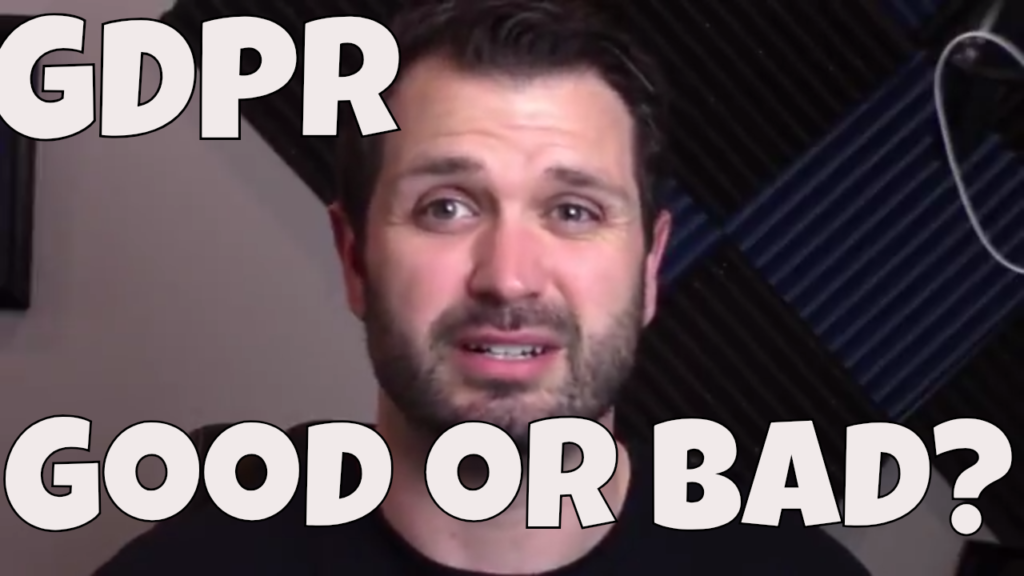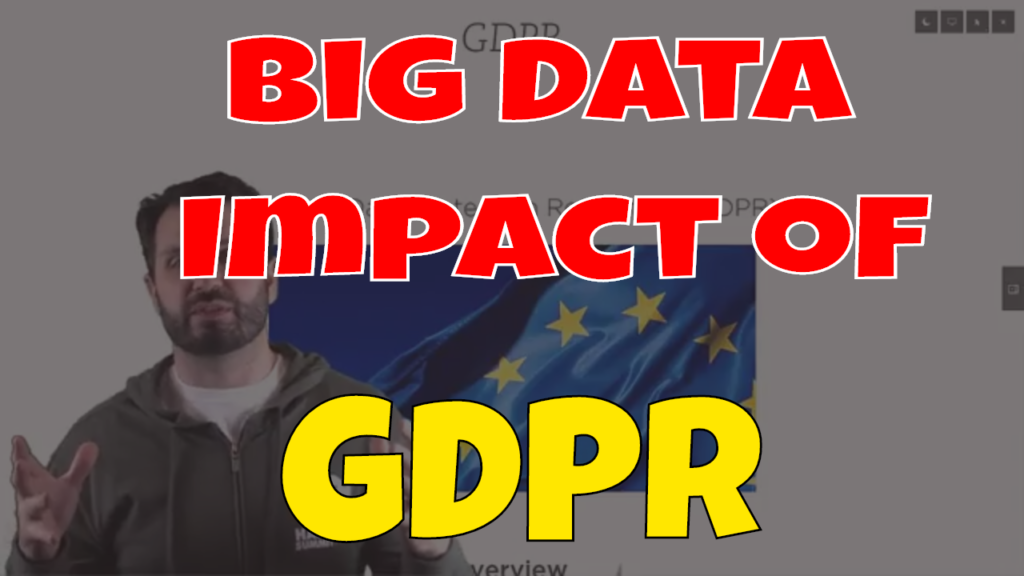Is GDPR Good or Bad?
How many emails have you received about GDPR? At this point I almost have to set a rule in Outlook to send all emails with the word “GDPR” in them to a separate folder. I’ve explained what GDPR is and how it applies to Data Engineer but is it good or bad. Generally regulations are put in place to make society better, but does Big Data need regulation? Find out my thoughts on the policies put in place with GDPR in the video below.
Transcript – GDPR Good Or Bad?
Hi folks! Thomas Henson here, with thomashenson.com. Today is another episode of Big Data Big Questions. Today, I’m going to jump back in a little bit more around GDPR. We want to find out, had a lot of questions, seen a lot of things on Twitter, and I just thought it would be a great time to discuss, is GDRP [Phonetic] good or bad?
This is not going to be about politics. It’s going to be about policy and what’s really driving GDPR. What does it really mean, as far as, is that a good thing for us that are involved in big data? And, it’s consumers. Find out more, right after this.
[Sound effects]
Welcome back. This is the second episode where we’re going to talk about GDPR. If you’re curious about what GDPR is and what it means to data engineers, make sure you check out the video that I did before just talking about, what does GDPR mean to data engineers, machine learning engineers, or data scientists?
I really wanted to focus this time on, we’ve talked about what it is, but what does it really mean? Is it a good thing? I’ve gotten a ton of emails just on my personal stuff, from people who’ve built websites for me, from different HortonWorks, and Cloudera, and everybody’s kind of talking about, what does GDPR mean to us? Every time you turn around right now, you’re going to have to update some kind of policy, whether it be from Apple on your iPhone, or from Android, or anybody that’s collecting or holding onto your data, all those privacy updates are all going on, and you’re going to have to click yes on each one of them.
Yes, I understand that you’re going to protect my data, and it’s going to be more private. Is that a good thing or is it a bad thing? Is it okay for us to have regulation around it?
I look at it from this perspective. I was thinking about it, and it’s like, if you really think about where we’re going, there’s regulation for everything. For most products, as they get big. What this really means to me, and why I think it’s a good thing, is because this shows that your digital data is growing up. It’s maturing. When you think about it, in America, when cars first came out, we didn’t really have regulations around it. You didn’t have to get a license. It was just something fun that you could do, and if you could afford a car, you could get it. As that product started maturing, we started realizing, “Hey, this is something that needs to be regulated to some extent.”
We need to have some kind of standards around who’s going to drive on what side of the road, and how all that’s going to work through. If you think about digital data, we’re getting to that point. A couple reasons why we’re at that point, if you think about it, the first thing, privacy matters. Privacy’s always kind of mattered, and people really pay attention to being able to be private and have those things. For a long time, data has not seen one of them.
We have regulations and laws around if people can go into private residencies without consent and things like that. Your data, it’s the same way, and that’s where we’re starting to look at it and say, “Okay, that data, you have rights to it. It’s yours. You created it, so your privacy does matter.” That’s where the regulations are coming. Also a big thing is, think about how many different data breaches we have.
For a long time, if you follow Troy Hunt, or anybody that’s big in security, you can always see at least weekly, they’re talking about a huge data breach that happened. That compounded with trying to figure out, “Okay, if you’re collecting these data, how much of a liability, how much is that for you, and then how much of a responsibility is it of yours if the data becomes breached? Are there certain standards that you should have to follow to be able to better protect that data, so that you can turn around and say, “Hey, we do have some bad actors out there, that have hacked and taken this data, but we went through these steps.”
There’s not really been a standard for what those steps are, and so this is a further implementation of it. The thing, and one of the reasons, a couple of the reasons, actually, that I think that it’s a good thing, right? Not talking politics here, just why I think GDPR’s good.
It gives you back control of your data. It gives you the opportunity to say, “Hey, I would like for you to be able to report and see what data you have on me. What does my digital footprint look like?” What kind of data are you collecting on me? You have the authorization to ask for that and to be able to get an answer to that.
Secondly, you can say, “Hey, I want to drop off. I want all my data gone. I don’t want you to collect and hold onto my data.” I think this is a big point, because while I’m on Facebook, and I’ve been a Facebook user for I don’t know how long, just a long time, I’ve heard of other people and other stories around people who’ve gone off Facebook. You’ve probably not seen them. They’ve deleted their profile, only to come back a year or two later, and all their stuff’s still there.
I can’t say that I’ve seen that happen for me, but I’ve heard a ton of stories, where I know that there much be some sort of truth to that. This is an opportunity where, if you do want to get off the grid, so it’s like, “Hey, you know, it’s 2018, I’m going to get off the grid,” this gives you the opportunity. That’s another reason why I think it’s really good. It puts you in control of your data and lets you decide.
Also, it’s going to create a framework for companies to have a standard around how they’re going to protect that data. It’s going to protect companies and organizations that collect data by having a set of standards that we’re able to follow, to say, “Hey, we’re doing as much as we can to be able to protect, and make sure that, your data, when it comes in, is as secure as can be.” This gives us the opportunity to start setting those standards and testing it. Maybe we won’t have as many data breaches in the future.
Maybe, we can trust and understand that, while there are bad actors out there, that maybe there will be less involvement around the hackers, because it really puts the onus on the people who collect the data. We had some of that before, but a lot of it has been, I would say, public perception. You want your public perception to be okay. How much of a law, and really bearing, is going to be on companies if that data is discovered, or data is breached? Now, this gives us the framework to say, “Hey, there are regulations, and we are saying that, you know, this is something that you need to protect.”
That was just my thoughts on it. I’d love to hear your thoughts. If anybody has any opposing views or anything like that, put them in the comments section here below or just reach out and ask. Let’s jump on YouTube, and let’s record a video, and maybe talk about it a little bit more. Let me know where I’m wrong, but, that’s my thoughts. I think, in general, GDPR is good. I think there’s going to be a lot of opportunities around products and around people with that expertise, so if you’re looking to get involved in big data, and you like looking into and following regulations, and putting security metrics into works, then I think GDPR is a good place to go.
I think there’s going to be a lot of companies that are going to make products. There’s going to be products that are out there, that’s going to help with GDPR compliance, because May 25th’s coming, 2018. I don’t know that everybody’s going to be ready. Until next time.

